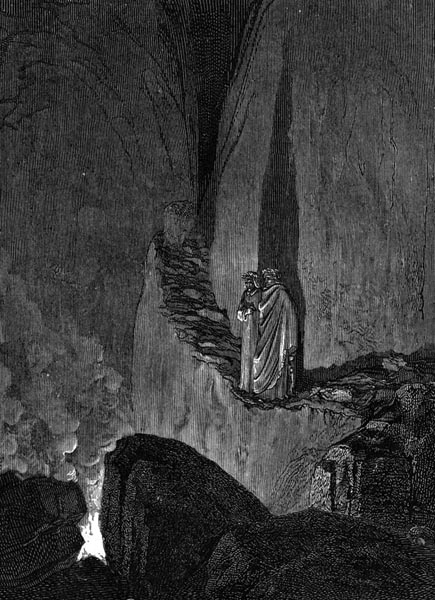Inferno Canto XXVI:43-84 Ulysses and Diomede

I stood on the bridge, having so risen to look, that if I had not caught hold of a rock I should have fallen in without being pushed. And the guide, who saw me so intent, said: ‘The spirits are inside those fires: each veils himself in that which burns him.’ I replied: ‘Master, I feel more assured from hearing you, but had already seen that it was so, and already wished to say to you, who is in that fire, that moves, divided at the summit, as if it rose from the pyre where Eteocles was cremated with his brother, Polynices?’
He answered me: ‘In there, Ulysses and Diomede are tormented, and so they go, together in punishment, as formerly in war: and, in their fire, they groan at the ambush of the Trojan horse, that made a doorway, by which Aeneas, the noble seed of the Romans issued out. In there they lament the trick, by which Deidamia, in death, still weeps for Achilles: and there, for the Palladium, they endure punishment.’
I said: ‘Master, I beg you greatly, and beg again so that my prayers may be a thousand, if those inside the fires can speak, do not refuse my waiting until the horned flame comes here: you see how I lean towards it with desire.’ And he to me: ‘Your request is worth much praise, and so I accept it, but restrain your tongue. Let me speak: since I conceive what you wish, and because they were Greeks they might disdain your Trojan words.’
When the flame had come, where the time and place seemed fitting, to my guide, I heard him speak, so: ‘O you, who are two in one fire, if I was worthy of you when I lived, if I was worthy of you, greatly or a little, when on earth I wrote the high verses, do not go, but let one of you tell where he, being lost through his own actions, went to die.’
Inferno Canto XXVI:85-142 Ulysses’s last voyage
The greater horn of the ancient flame started to shake itself, murmuring, like a flame struggling in the wind. Then moving the tip, as if it were a tongue speaking, gave out a voice, and said: ‘When I left Circe, who held me for more than a year, near to Gaeta, before Aeneas named it, not even my fondness for my son, Telemachus, my reverence for my aged father, Laërtes, nor the debt of love that should have made Penelope happy, could restrain in me the desire I had, to gain experience of the world, and of human vice and worth.
I set out on the wide, deep ocean, with only one ship, and that little company, that had not abandoned me. I saw both shores, as far as Spain, as far as Morocco, and the isle of Sardinia, and the other islands that sea washes. I, and my companions, were old, and slow, when we came to that narrow strait, where Hercules set up his pillars, to warn men from going further. I left Seville to starboard: already Ceuta was left behind on the other side.
I said: ‘O my brothers, who have reached the west, through a thousand dangers, do not deny the brief vigil, your senses have left to them, experience of the unpopulated world beyond the Sun. Consider your origin: you were not made to live like brutes, but to follow virtue and knowledge.’ With this brief speech I made my companions so eager for the voyage, that I could hardly have restrained them, and turning the prow towards morning, we made wings of our oars for that foolish flight, always turning south.
Night already saw the southern pole, with all its stars, and our northern pole was so low, it did not rise from the ocean bed. Five times the light beneath the moon had been quenched and relit, since we had entered on the deep pathways, when a mountain appeared to us, dim with distance, and it seemed to me the highest I had ever seen. We rejoiced, but soon our joy was turned to grief, when a tempest rose from the new land, and struck the prow of our ship. Three times it whirled her round, with all the ocean: at the fourth, it made the stern rise, and the prow sink, as it pleased another, till the sea closed over us.’



No comments:
Post a Comment